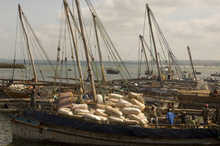
Typical street scene in Santa Ana, El Salvador. (Photo: iStock)
IMF Survey: Truly Integrated Market Would Bring Benefits to East Africa
March 15, 2012
- East African Community has achieved a lot in its first decade
- But important nontariff barriers remain between community members
- Integration process calls for giving up sovereignty to supranational entities
Only a truly integrated market is likely to give East African Community countries the full benefits of improved productivity, competitiveness, and welfare, IMF Deputy Managing Director Naoyuki Shinohara said in Arusha, Tanzania.

Cargo dhows in Zanzibar, Tanzania. East African Community customs union, common market not yet fully running (photo: Ellen Rooney/Newscom)
EAST AFRICAN COMMUNITY CONFERENCE
Speaking February 27 at a conference that assessed the benefits of regional integration in the decade since the five-nation grouping was established, Shinohara said the community had achieved a lot in its first 10 years. Existing members had achieved strong economic track records, and more countries had applied to join.
But there seems to be a long way to go toward better implementation of the community’s customs union and common market, Shinohara said. “Important nontariff barriers remain between East African Community member countries. Without a truly integrated market, the community is not likely to see the full benefits of improved productivity, competitiveness, and welfare.”
East African Community Secretary General Richard Sezibera noted that the community’s secretariat had identified removal of nontariff barriers as a major work priority in 2012. “Removal of restrictions on capital flows should serve as a catalyst for capital market development and for the provision of long-term and risk capital most needed to spur economic development,” Sezibera said.
More than 30 think tanks, civil service organizations, and media representatives participated in the February 27–28 conference, which was held in the Tanzanian city that hosts the East African Community’s headquarters. The organization comprises Burundi, Kenya, Rwanda, Tanzania, and Uganda.
Larger common market
Shinohara noted that the community comprises countries with a combined population of more than 130 million. With further expansion a real possibility, the grouping faces the question of finding the optimal pace of integration. “The challenge is how to balance the prospective benefits of a larger common market against the greater complexity that comes with a more diverse membership,” Shinohara said.
Countries benefiting from rapid productivity growth and improving living standards will be more ready to tackle the adjustment challenges involved with membership in a common market, Shinohara stated. He noted that IMF analysis shows a gap between the countries experiencing rapid productivity growth, such as Tanzania, for example, and slower growing countries.
“This is worrisome, as a widening income gap is opening up between some of the EAC countries. One issue here may be the importance of national reforms to strengthen business climates and foster productivity as a supplement to the regional integration effort,” Shinohara said.
Oxford University professor Paul Collier called for political commitments towards reinvigorating infrastructure in the East African Community. He noted that the community has a modern economy. “Therefore you need a big market within the region; and for the market to grow, you will need good transport infrastructure like railways, ports, and others. If you don't do that, you will be dead in the water," Collier said.
Public confidence
European Union ambassador to the East African Community Filiberto Ceriani Sebregoni told participants a single market is to a big extent a legal construct. “Implementation requires well functioning institutions and legal systems,” Sebregoni said. “Strength, mandate, and public confidence in institutions is essential. While the economic gains are substantial in terms of employment, income, and inflation, the process calls for voluntarily relinquishing sovereignty to supranational institutions.”
Summarizing the conference, IMF African Department Director Antoinette Sayeh said the discussions had highlighted four issues that would be important to the East African Community as it seeks to further strengthen integration in its second decade.
• Ensuring strong, broad-based growth in community countries. Apart from the important ingredient of sound macroeconomic management, this raised questions of how to effectively implement the community’s customs union and common market to promote regional investment and trade;
• Promoting closer integration of the community’s financial markets. E-banking has been an area of success, but the more traditional banking and capital markets remain segmented;
• Establishing budget management, and drawing lessons from the euro zone on the fiscal requirements for effective monetary union; and
• Harmonizing monetary and exchange rate policies during the transition to monetary union.
Sezibera said the challenges in the euro zone such as those that relate to fiscal policy, statistics, a stabilization facility, and ensuring balanced economic growth are some of the issues currently under discussion by a team of senior community officials.
East African Community Deputy Secretary General Enos Bukuku noted that policy priorities to help promote and facilitate regional integration include “common measurability and comparability in statistics, a strengthened East African Court of Justice, and establishment of a single customs territory and authority.”


